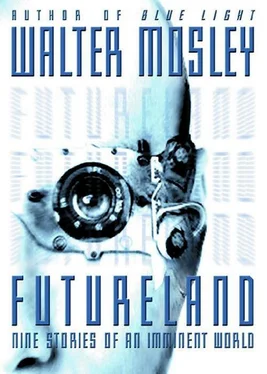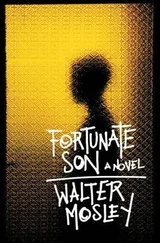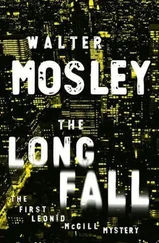“Yes,” said Ptolemy. “And the robot plane that took Nina to the island where we picked her up. We had hundreds of two-legged escape routes. The problem was that we didn’t have enough time to warn everyone before the intercorporate police force was called in.”
“What happens to the ones they caught?” a small woman with a red beard asked.
“Un Fitt is already locating those that were captured and putting logic into play that will release them into our hands.”
“I thought Un Fitt was discovered by the cops,” Neil said. “Wouldn’t they just shut him down?”
“Un Fitt is an operating system,” Ptolemy replied. “His program, which is self-altering, is stored in over ten thousand dump-sites, which are designated by a tenth power randomizer. These addresses, once found, are erased from the running program’s system. Self-generated updates to his system are downloaded on an hourly basis to an additional ten thousand sites. These updates can be retrieved via radio waves. Because of this system it is virtually impossible to shut Un Fitt down permanently; it would be damned hard to even force him to take a step back in his own intellectual evolution.”
“Did God make those programming decisions?” Neil was surprised at the sarcasm in his own voice.
“I did the peripheral programming,” Ptolemy said. “I set up the system to be inserted in one of Randac’s satellite computers. I set up everything but then I let the spirit I discovered years ago inform the internal logic of the system.”
“Vat does dat mean?” asked a tall man named Blaun. He had an east European accent and radiant blue eyes.
“Years ago,” Ptolemy said, “I discovered that the atmosphere of Earth was enveloped by an intelligent ether. It’s a vast store of knowledge that exists in an area between five hundred and two thousand miles above the surface.”
“An intelligence?” someone asked.
“That’s all I call it. It’s an awareness, a consciousness. For many years this consciousness has been trying to communicate with us — by radio waves. I found the pattern when I was a child not more than four. Over the next ten years I was able to use a transmitter to communicate with the entity. Back then I thought that it was God; now I’m not so sure. I don’t even know what the relationship is between it and us. I mean, it might have created us, but there’s also an argument that we, through the electronic nature of our minds, might be the cause of this meta-intelligence. Then again it could just be some kind of celestial traveler, stopping for a few centuries and trying to understand the DNA-based fungus that makes up all life here on Earth.
“At any rate, I invited the entity to enter into the Un Fitt system. It created the logic of Un Fitt and I used that logic to create the schools that trained all of you.”
“Trained us for what?” a woman named Thedra asked.
“To advance,” Ptolemy said. “To change. The way the world is today, change has become a function of profit. Money makes change. There’s very little of the individual left. Our minds are made to stagnate, our bodies are fuel for the systems of production. Maybe some of that is good. But then again maybe it isn’t. What Un Fitt and I are trying to do is create revolutionaries, people who aren’t satisfied with just being prods.”
“What else is there?” Thedra asked.
“You see?” Ptolemy said. “Two years ago you wouldn’t have asked that question. Two years ago you just showed up at the assignment booth and went where they told you to go. You followed the system hoping that you could put in your fifty-three years and then retire on the half of your salary that the union kept aside for you.
“Don’t get me wrong, not all of the prods that Un Fitt found have worked out. Over twelve hundred have turned us in to the authorities.”
“Then why weren’t we caught long ago?” a tall Asian man asked.
“Because of Un Fitt,” Ptolemy said. “He has superimposed a communications net over every prod we have, using our ID chips. Every communication going out is first reviewed and edited by Un Fitt’s matrices.”
“So what did you do when you discovered the traitors?” Athria asked.
“Nothing. We simply supplied a realistic hyper-animae police official who thanked the whistle-blower and who then asked them to remain as a spy. If they were too afraid we thanked them and offered a transfer, cautioning them to keep quiet because of a broad-based ongoing investigation.”
“What about somebody going in person to the CBI or somewhere?” Neil asked. “Some of them must have done that.”
“Only six,” Ptolemy replied. “Six out of twelve hundred eighty-nine.”
“What did you do about them?”
“All CBI informants go through a background check before their claims are investigated. In each case we created a fairly serious crime that the claimant seemed to have committed. They were then subjected to automatic justice and sentenced to low-security prison systems. Each one was visited by an electronic apparition that warned them of a worse fate should they persist in trying to expose Un Fitt.”
“Have you killed anybody?” Neil asked.
“No. But the question has merit. Un Fitt has set up assassination protocols in case of extreme circumstances. In the best of a bad situation we could strip the prod of his consciousness and transmit it into the ether.”
“To God?” Oura asked.
“Or whatever,” Ptolemy said. “That way the perpetrator is dead to the world but alive elsewhere.”
“Vat if you could not do this process?” Blaun asked.
“Then we were ready to kill,” Ptolemy said. “It’s wrong, I know, but it’s the only way we could see to keep the idea alive. The world is going in the wrong direction. Our judges are machines, our prisons and military and mental institutions and workplaces are planning to mechanize their human components with computerized chemical bags. The spirit is being squashed for the sake of production and profit. If we don’t do something the race itself will become a mindless machine.”
“But now the dream’s over,” Neil said. “Now we’re underground in the desert and there’s nothing we can do to change anything.”
“I wish it were true,” Ptolemy said. “I wish we could stay here for the rest of time, playing games with Un Fitt, designing toys that would make men and women better at being themselves.”
“Why can’t we, Popo?” Nina asked.
Ptolemy stared at his sister and then at each one of the fifteen prods in turn.
“What?” the woman with the red beard asked.
“While studying the CPD, Un Fitt found a relationship between the chief and the International Socialist Party.”
“Itsies,” Athria uttered.
“Chief Nordman is a high-ranking member of the secret arm of IS. From his records, Un Fitt found that not only have they moved their operations to the Caucasus Mountains, but they’ve also set up a laboratory to study the molecular nature of viruses.”
“And?” Blue Nile asked.
“They’re designing viral strains that target racial indicators.”
“Race killers?” Nina whispered.
“Exactly.”
For quite a while no one spoke.
“What is their first move?” Neil asked at last.
“To test the host virus on blacks.”
“No.”
“Maybe,” Ptolemy said, “the entity is a god, and he called us to stop this insanity. Maybe it’s all fate.”
“Or maybe it’s just a nightmare,” Oura offered.
Later that evening Blue Nile said to Ptolemy Bent, “If what you’re saying is true, then there’s nothing we can do.”
“And no time to do it in,” Nina Bossett added.
“There is a small chance,” said Ptolemy.
Читать дальше












